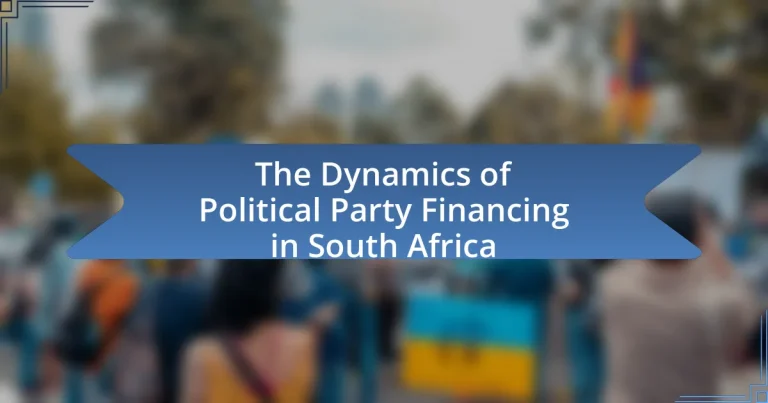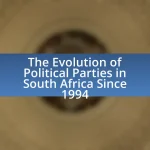The main entity of the article is political party financing in South Africa. The article provides a detailed examination of the key aspects of political party financing, including state funding, private donations, and transparency regulations established by the Political Party Funding Act of 2018. It discusses how political parties raise funds through various methods, the influence of donations on party operations, and the regulatory framework that governs financing practices. Additionally, the article highlights the challenges faced by parties, particularly smaller ones, regarding funding disparities and the implications of corruption. It also explores future trends in financing, emphasizing the role of technology and best practices for enhancing accountability and sustainability in political party financing.
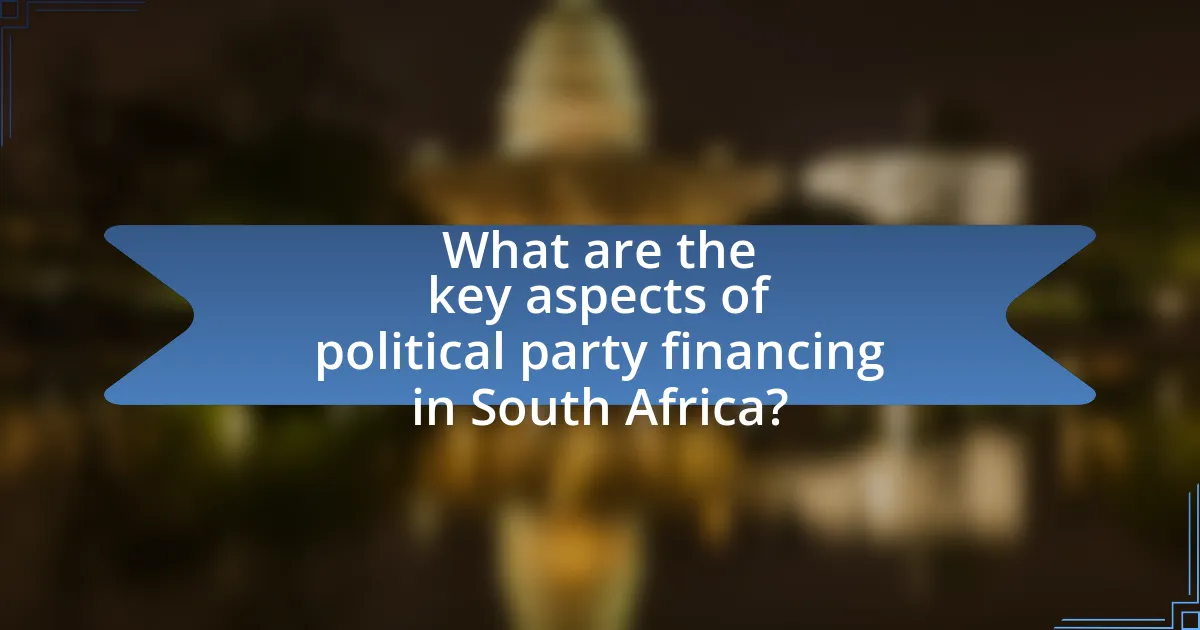
What are the key aspects of political party financing in South Africa?
The key aspects of political party financing in South Africa include state funding, private donations, and transparency regulations. State funding is provided to political parties based on their representation in the National Assembly and provincial legislatures, with the aim of promoting democracy and equitable access to resources. Private donations, while allowed, are subject to strict regulations to prevent undue influence and corruption, requiring parties to disclose contributions above a certain threshold. Transparency regulations mandate that parties report their funding sources and expenditures, enhancing accountability and public trust. These aspects are governed by the Political Party Funding Act of 2018, which aims to create a more equitable and transparent political financing landscape in South Africa.
How do political parties in South Africa raise funds?
Political parties in South Africa raise funds through various methods, including membership fees, donations from individuals and businesses, state funding, and fundraising events. Membership fees provide a steady income stream, while donations can significantly boost financial resources; for instance, the Electoral Commission of South Africa reported that in the 2019 elections, political parties received over R1.3 billion in donations. State funding is allocated based on the number of votes received in the previous election, ensuring that parties with greater public support receive more financial assistance. Additionally, fundraising events, such as galas and auctions, are organized to engage supporters and generate revenue.
What are the primary sources of funding for political parties?
The primary sources of funding for political parties in South Africa include state funding, private donations, and membership fees. State funding is allocated based on the number of votes received in the previous election, ensuring that parties with greater public support receive more financial resources. Private donations from individuals and corporations also play a significant role, with regulations in place to limit the amount and require disclosure to promote transparency. Membership fees collected from party members contribute to the overall funding, providing a steady income stream for party operations. According to the Political Party Funding Act of 2018, these funding sources are regulated to enhance accountability and reduce corruption in political financing.
How do donations from individuals and corporations influence party financing?
Donations from individuals and corporations significantly influence party financing by providing essential funding that shapes political campaigns and party operations. In South Africa, political parties rely heavily on these contributions to cover expenses such as advertising, staff salaries, and event organization. For instance, the Electoral Commission of South Africa reported that in the 2019 elections, political parties received substantial financial support from both private individuals and corporate entities, which directly impacted their ability to compete effectively. This reliance on donations can lead to increased political influence from wealthy donors, as parties may prioritize the interests of their financial backers in policy-making and governance.
What regulations govern political party financing in South Africa?
The regulations governing political party financing in South Africa are primarily outlined in the Political Party Funding Act of 2018. This legislation establishes a framework for the funding of political parties, including provisions for the disclosure of funding sources and limits on donations. The Act mandates that parties must disclose all donations exceeding a specified threshold, ensuring transparency and accountability in political financing. Additionally, the Electoral Commission of South Africa oversees compliance with these regulations, reinforcing the integrity of the political funding process.
What laws are in place to ensure transparency in party funding?
In South Africa, the laws ensuring transparency in party funding include the Political Party Funding Act of 2018 and the Electoral Act of 1998. The Political Party Funding Act mandates that all political parties disclose their funding sources, including donations above a specified threshold, to promote accountability and transparency. This law also establishes a framework for public funding of political parties, ensuring that funds are allocated fairly based on electoral performance. The Electoral Act complements these provisions by regulating the conduct of elections and the financing of political parties, thereby reinforcing the need for transparency in financial dealings. These laws collectively aim to mitigate corruption and enhance public trust in the political system.
How do these regulations impact the financial operations of political parties?
Regulations significantly impact the financial operations of political parties by imposing strict guidelines on funding sources and expenditure limits. These regulations, such as the Political Party Funding Act in South Africa, require parties to disclose their funding sources, which enhances transparency and accountability. For instance, the Act mandates that parties report donations above a certain threshold, thereby limiting the influence of undisclosed funding and promoting fair competition among parties. Additionally, these regulations can restrict the amount of money parties can spend during elections, which directly affects their campaign strategies and outreach efforts. By enforcing these financial constraints, the regulations aim to reduce corruption and ensure that all parties operate on a more level playing field.
What challenges do political parties face regarding financing?
Political parties in South Africa face significant challenges regarding financing, primarily due to reliance on private donations, which can lead to issues of transparency and accountability. The lack of a comprehensive regulatory framework complicates the situation, as parties often struggle to secure consistent funding while adhering to legal requirements. For instance, the Political Party Funding Act of 2018 introduced measures to enhance transparency, yet many parties still encounter difficulties in disclosing funding sources, which can undermine public trust. Additionally, economic constraints and competition for donor attention further exacerbate financial instability, limiting parties’ ability to campaign effectively and engage with constituents.
How does corruption affect political party financing?
Corruption significantly undermines political party financing by diverting funds from legitimate sources and fostering reliance on illicit contributions. In South Africa, this is evident as political parties may accept donations from corrupt entities, which can lead to compromised integrity and accountability. A report by the South African Institute of Race Relations highlights that corruption in public procurement often results in inflated contracts, with funds intended for public services being funneled into party coffers. This creates a cycle where parties prioritize the interests of corrupt donors over the electorate, ultimately eroding public trust in the political system.
What are the implications of limited funding for smaller parties?
Limited funding for smaller parties significantly hampers their ability to compete effectively in elections. This financial constraint restricts their access to essential resources such as campaign materials, advertising, and outreach efforts, which are crucial for gaining visibility and voter support. For instance, smaller parties often struggle to secure media coverage and public engagement compared to larger, well-funded parties, leading to a diminished presence in the political landscape.
Moreover, limited funding can result in reduced organizational capacity, making it challenging for smaller parties to mobilize volunteers, conduct research, and develop comprehensive policy platforms. According to the Electoral Commission of South Africa, smaller parties received only a fraction of the total funding allocated to political parties, which directly correlates with their lower electoral success rates. This creates a cycle where limited funding leads to poor performance, further entrenching the dominance of larger parties and reducing the overall diversity of political representation.
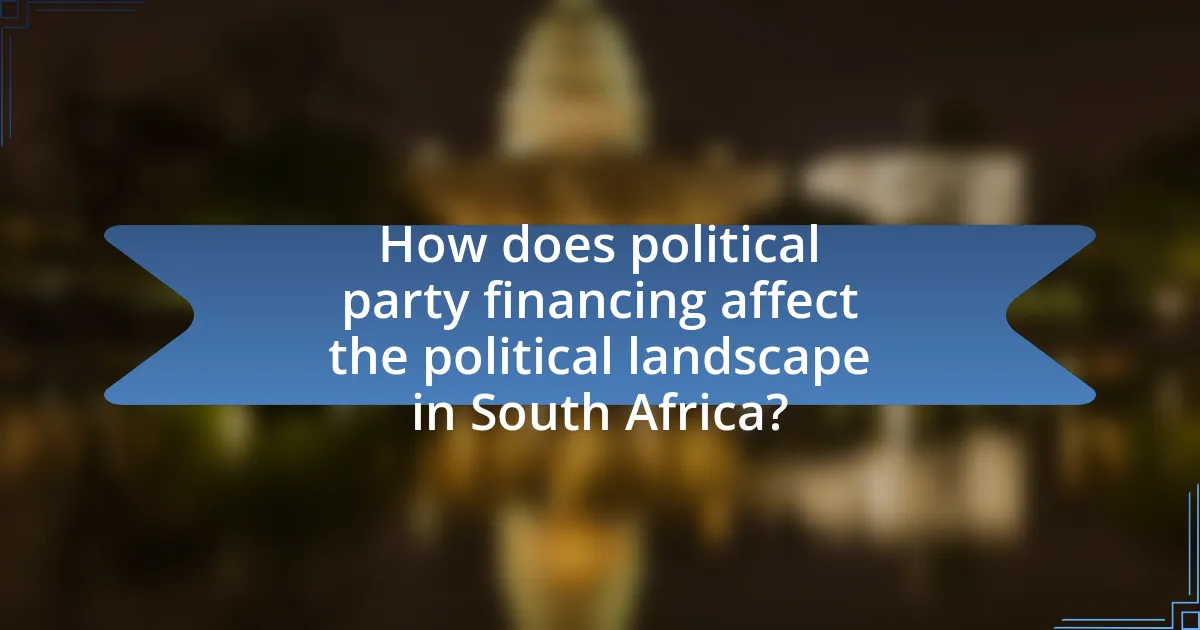
How does political party financing affect the political landscape in South Africa?
Political party financing significantly influences the political landscape in South Africa by determining which parties can effectively compete in elections and shape policy agendas. The reliance on private donations and corporate funding often leads to disparities in resources among parties, with larger parties like the African National Congress benefiting from substantial financial backing, which enhances their visibility and outreach. This financial advantage can skew democratic processes, as parties with fewer resources struggle to gain traction, limiting voter choice and representation. Furthermore, the lack of transparency in funding sources raises concerns about accountability and potential corruption, as seen in various scandals involving undisclosed donations. The Electoral Commission of South Africa reported that in the 2019 elections, the ANC received over 55% of total party funding, illustrating the impact of financial disparities on electoral outcomes and governance.
What role does financing play in electoral success?
Financing plays a crucial role in electoral success by enabling political parties to effectively campaign, reach voters, and communicate their messages. Adequate funding allows parties to invest in advertising, organize events, and mobilize grassroots support, which are essential for gaining visibility and voter engagement. For instance, in South Africa’s 2019 elections, the African National Congress (ANC) utilized substantial financial resources to dominate media coverage and outreach efforts, resulting in a significant electoral victory. This demonstrates that financial backing directly correlates with a party’s ability to influence public perception and secure votes.
How does access to funding influence campaign strategies?
Access to funding significantly influences campaign strategies by determining the scope and reach of political messaging and outreach efforts. Political parties with greater financial resources can invest in extensive advertising, hire skilled campaign staff, and utilize advanced data analytics to target voters effectively. For instance, during the 2019 South African elections, the African National Congress (ANC) allocated a substantial portion of its budget to media campaigns, which allowed them to dominate public discourse and maintain voter engagement. In contrast, parties with limited funding often struggle to compete, relying on grassroots efforts and volunteer support, which can restrict their visibility and impact. This disparity in funding leads to unequal opportunities in shaping public perception and mobilizing voter turnout.
What impact does financing have on voter perception and trust?
Financing significantly impacts voter perception and trust by influencing the perceived integrity and transparency of political parties. When voters perceive that a party is well-funded, they may associate this with greater legitimacy and capability to govern effectively. Conversely, if financing sources are opaque or linked to corruption, it can lead to skepticism and distrust among voters. Research indicates that in South Africa, the public’s awareness of party financing sources directly correlates with their trust in political institutions, as highlighted in the study “Political Party Financing in South Africa: A Critical Analysis” by authors Smith and Nkosi, which found that transparency in funding enhances voter confidence.
How do political alliances and coalitions relate to financing?
Political alliances and coalitions significantly influence financing by pooling resources and sharing financial burdens among member parties. This collaborative approach allows parties to access larger funding pools, which can enhance their electoral competitiveness. For instance, in South Africa, the African National Congress (ANC) has historically formed alliances with smaller parties to consolidate financial support, thereby increasing their overall campaign budgets. Additionally, coalitions can attract funding from diverse sources, including private donors and public funding, which can be critical in a competitive political landscape. This financial synergy often leads to more robust campaign strategies and greater electoral success.
What financial considerations influence party mergers or alliances?
Financial considerations that influence party mergers or alliances include the need for increased funding, resource sharing, and the potential for enhanced electoral competitiveness. Political parties often face financial constraints that limit their operational capabilities; thus, merging or forming alliances can provide access to a larger pool of financial resources, enabling them to fund campaigns more effectively. For instance, in South Africa, parties may combine their donor bases, which can lead to increased contributions and financial stability. Additionally, alliances can reduce costs associated with campaigning and administrative functions, allowing parties to allocate resources more efficiently. Historical examples, such as the merger of the Democratic Alliance and other smaller parties, illustrate how financial motivations can drive strategic partnerships to enhance overall funding and electoral success.
How does financing affect the stability of coalitions in government?
Financing significantly affects the stability of coalitions in government by influencing the resources available for political activities and the ability to maintain unity among coalition partners. When financial resources are ample, coalition parties can effectively fund their operations, campaign efforts, and public outreach, which fosters cooperation and reduces internal conflicts. Conversely, limited financing can lead to competition for resources among coalition members, increasing tensions and potentially destabilizing the coalition. For instance, in South Africa, the reliance on donor funding has been shown to create dependencies that can strain relationships within coalitions, as parties may prioritize their financial backers’ interests over collective goals. This dynamic illustrates how financial considerations directly impact the cohesion and longevity of governmental coalitions.
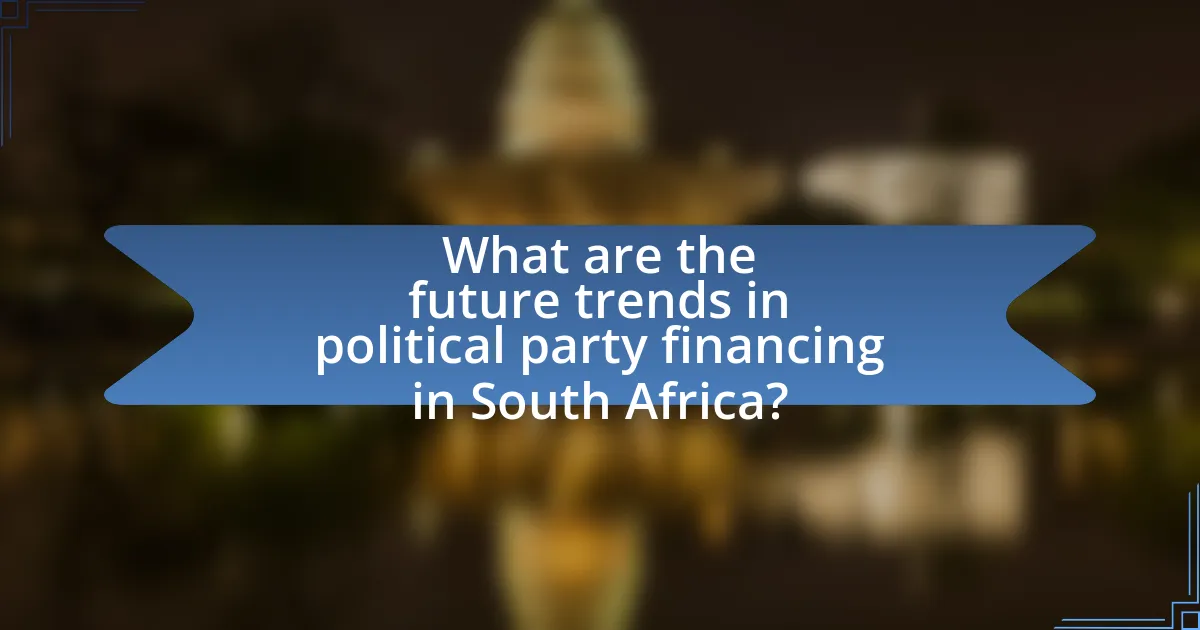
What are the future trends in political party financing in South Africa?
Future trends in political party financing in South Africa indicate a shift towards increased transparency and reliance on digital fundraising methods. The Electoral Commission of South Africa has emphasized the need for political parties to disclose funding sources, which aligns with global trends towards accountability. Additionally, the rise of social media platforms is facilitating direct engagement with voters, allowing parties to raise funds through online campaigns. This transition is supported by the growing use of technology in political mobilization, as evidenced by the increased online donations during recent elections.
How is technology changing the landscape of political fundraising?
Technology is transforming political fundraising by enabling more efficient, targeted, and accessible fundraising strategies. Digital platforms allow political parties in South Africa to reach a broader audience through social media, email campaigns, and crowdfunding, significantly increasing their fundraising potential. For instance, a report from the Electoral Commission of South Africa highlighted that online donations have surged, with many parties reporting a rise in contributions from younger voters who prefer digital transactions. Additionally, data analytics tools help campaigns identify and engage potential donors more effectively, optimizing fundraising efforts and enhancing transparency in financial reporting.
What role do social media and online platforms play in fundraising efforts?
Social media and online platforms are crucial in fundraising efforts as they enhance outreach, engagement, and donation facilitation. These platforms allow political parties in South Africa to connect with a broader audience, mobilizing supporters quickly and effectively. For instance, a study by the Pew Research Center indicates that 69% of adults in South Africa use social media, providing a vast potential donor base. Furthermore, online fundraising tools enable seamless transactions, making it easier for individuals to contribute financially. This combination of wide reach and ease of use significantly boosts fundraising capabilities for political parties.
How can technology enhance transparency in political financing?
Technology can enhance transparency in political financing by enabling real-time tracking and reporting of campaign contributions and expenditures. Digital platforms allow for the public disclosure of financial transactions, making it easier for citizens to access and scrutinize funding sources. For instance, blockchain technology can provide immutable records of donations, ensuring that all financial activities are verifiable and traceable. Additionally, data analytics tools can analyze funding patterns, revealing potential conflicts of interest or illicit funding. In South Africa, initiatives like the Electoral Commission’s online disclosure system exemplify how technology can facilitate transparency, as they allow voters to see how political parties are funded and hold them accountable.
What best practices can political parties adopt for sustainable financing?
Political parties can adopt several best practices for sustainable financing, including diversifying funding sources, implementing transparent financial reporting, and engaging in grassroots fundraising. Diversifying funding sources reduces reliance on a single donor or funding stream, which can mitigate risks associated with financial instability. For instance, parties can seek contributions from individual supporters, small businesses, and membership fees, alongside traditional large donations. Transparent financial reporting builds trust with the electorate and stakeholders, as it ensures accountability and compliance with regulations, which is crucial in South Africa’s political landscape where corruption concerns are prevalent. Engaging in grassroots fundraising not only fosters community support but also enhances the party’s connection with constituents, making them more resilient to economic fluctuations. These practices are supported by the South African Electoral Commission’s guidelines, which emphasize the importance of transparency and accountability in political financing.
How can parties diversify their funding sources effectively?
Parties can diversify their funding sources effectively by engaging in multiple fundraising strategies, including grassroots donations, corporate sponsorships, and public funding. Grassroots donations allow parties to tap into small contributions from a large number of supporters, which can enhance community engagement and loyalty. Corporate sponsorships provide significant financial support, but parties must ensure transparency to avoid conflicts of interest. Public funding, available in many democratic systems, can offer a stable revenue stream, especially when tied to electoral performance, as seen in South Africa’s Political Party Funding Act of 2018, which allocates funds based on the proportion of votes received. By combining these methods, parties can create a balanced funding portfolio that mitigates risks associated with reliance on a single source.
What strategies can enhance accountability in political party financing?
Implementing transparent reporting requirements for political party financing can significantly enhance accountability. By mandating that political parties disclose their funding sources and expenditures in a standardized format, stakeholders can better track financial flows. For instance, South Africa’s Political Party Funding Act of 2018 requires parties to report donations above a certain threshold, promoting transparency. Additionally, establishing independent oversight bodies to audit party finances can further ensure compliance with regulations and deter illicit funding practices. Research indicates that countries with stringent financial disclosure laws experience lower levels of corruption in political financing, reinforcing the effectiveness of these strategies.
